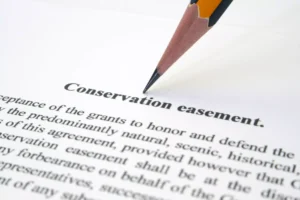Charitable Deductions for Conservation Easements
The IRS is on a winning streak, and that is not generally good news for taxpayers. A closer look at the transactions that the IRS has been challenging in court and winning reminds me of that phrase my mother used to use – if it sounds too good to be true…
Charitable Deductions for Conservation Easement
 A charitable deduction for a conservation easement has been in the tax law for some time. Congress put in place for a taxpayers to claim a charitable deductions for a contributions of an interest in real property or land. This only pertains to a qualified organization exclusively for conservation purposes.
A charitable deduction for a conservation easement has been in the tax law for some time. Congress put in place for a taxpayers to claim a charitable deductions for a contributions of an interest in real property or land. This only pertains to a qualified organization exclusively for conservation purposes.
Conceptually, a landowner agrees not to do something with its property in perpetuity. The reasons to enter into one of these arrangements are diverse. Perhaps it’s to protect open space by forgoing development, to preserve the land as farmland, or to set aside historically important structures.
The eligible deduction is based on the difference in the fair market value of the property before and after the easement. Valuation issues are ripe for abuse and as you might guess, that’s where the trouble exists.
It is important to note that the strategy is viable and there are a number of charitable organizations that can and do facilitate these transactions legitimately.
Promotors grabbed hold of this idea and began forming partnerships to “share” the deduction amongst investors in a venture whose goal was to provide outsized deductions versus the economic realities of the transaction.
The arrangement has a number of variations but typically follows the following pattern.
Promoters obtain an interest in real property via a partnership or other pass-through type entity. They then sell interests to investors who acquire a percentage of the partnership. The partnership then makes a contribution of the easement.
The magic is in the valuation of the easement which is grossly overstated. The deduction generated for the investors is well in excess of their purchase price paid for their interest in the partnership, often by a factor of 2 to 9x.
These transactions have risen to the top of the IRS’s radar. They are considered listed transactions or abusive tax shelters if entered after January 1, 2010. That means that special disclosure is required on your tax return only if you are claiming a benefit from one of these transactions.
That disclosure is required every year in which you are a participant in the venture. The IRS also has included these transactions on its list of “Dirty Dozen Tax Scams.”